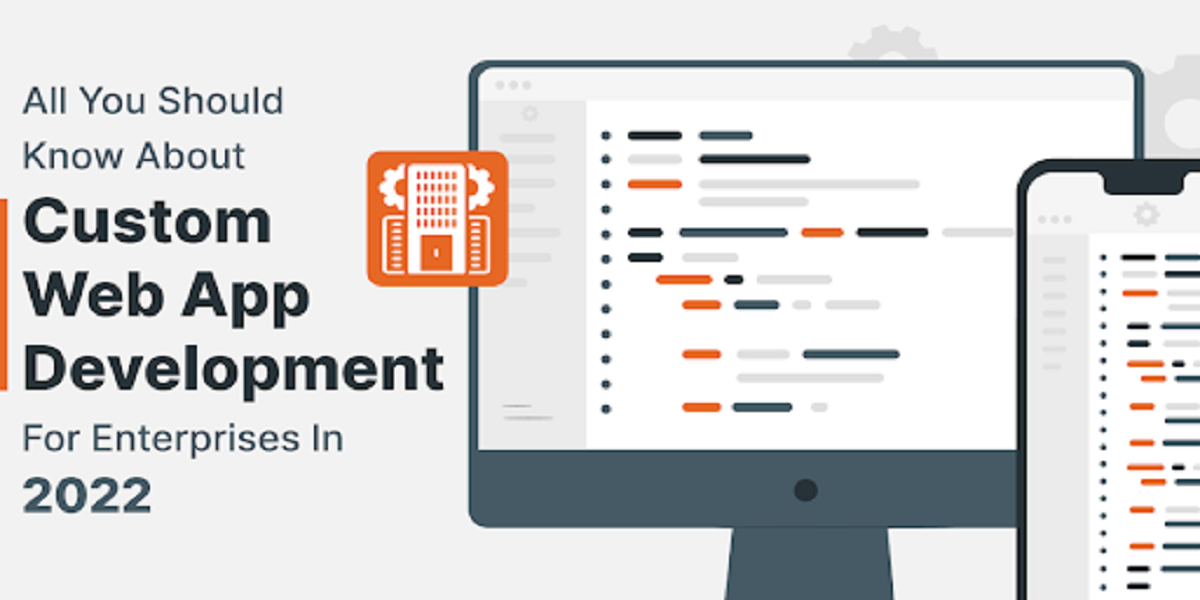
All You Should Know About Custom Web App Development For Enterprises In 2022
- By Rohit Bateja
- 28-07-2022
- Web Apps
Technological advancements have made website load times and user experience a breeze compared to their early days. Yet, they lack the look, feel, and responsiveness of mobile apps, especially on handheld devices. This is a problem for businesses that rely on a website as the primary digital marketing asset, especially if they plan to target mobile-first audiences.
Web applications are the solution to this problem for enterprises. They offer the best of both worlds: quick load and response times of optimized apps and full functionality of a website. Moreover, with an increasing number of people accessing the internet via smartphones and other mobile devices, web apps are looking to make an ever-increasing mark in businesses’ marketing practices.
If you want in on the action for your business, you simply need to hire web developer in India to build one for you. This article will help you on that journey, as knowing about what 2022 has to offer regarding web app development technologies, techniques, and content-carrying capabilities will enable you to customize your business’s web application for better ROI.
The Reasons To Go For Web Applications
Websites are the go-to web marketing tool for businesses to inform and engage their customers. So, why the push to have web applications then? The answer lies in the benefits web apps offer.
Reduced Load Times
Nobody likes to wait for a website to load, but it can happen for numerous reasons. The website content may be bulky with high power consuming content; the device software may not be the latest version which causes processing issues; the device itself may be old and not powerful enough, etc. The result in all cases is similar- slow loading website and hence, a user’s reduced interest in the brand. Web applications mitigate this problem by reducing page load times immensely. It facilitates high responsiveness, which improves engagement and user experience.
Less Storage Space Requirement
Dedicated applications are a great piece of technology. However, they can take up too much storage space, especially with regular updates adding more features. Web applications- particularly progressive web applications -are the better alternative, as they are light on storage space with the bulk contained on the server-side.
Universal Compatibility
Websites have one partial benefit over apps. While websites are accessible from any device, mobile apps are usually platform-specific. All one needs to access a website is a browser and an internet connection. This universal compatibility of websites makes them a great marketing tool: the outreach potential is practically unlimited. Web applications share this universal compatibility advantage of websites as they too only need a browser for access.
Dynamic Updates
Mobile applications must be downloaded and installed with constant updates to keep them functioning optimally, ensure security, and add new features to them. However, this process is time-consuming. Web applications don’t suffer from this issue as the updates happen on the server-side. They can even occur in real-time, dynamically delivering the required content.
Easier And Cheaper To Create
Any reasonable website development services provider will agree that websites are cheaper to create than mobile applications. Creating a web app is cheaper than both. Plus, modern tools like full tech stack for web development have made it easier than ever to create web applications. So with web applications, you are getting functionalities similar to that of an app but at a cost and creation speed that’s even less than a website.
High Engagement
A website’s primary purpose is to inform its visitors about the business in an appealing way. There is little interactivity baked into it when compared to a mobile app. This reduced interactivity also reduces engagement levels. Web applications are the antidote to this problem. They add the much-needed interactivity features in a website-like environment, going beyond mere data visualization to incorporate data manipulation.
The Best Web App Development Practices In 2022
The benefits offered by web applications have made them a critical investment for businesses. Related technology development through the years has yielded the capability for developers to create a variety of web applications that fulfill their purpose with aplomb. However, in 2022, you should have the following practices in your web app development process to get the best results.
The Right Tech Stack
How well a task gets done depends on the tools chosen for it. For web app developers, 2022 offers a plethora of choices in the form of full technology stacks. They include web programming languages like HTML5, web application frameworks, a variety of design templates, content management systems, server hosts, dedicated libraries, etc. You can select the one that works best for your custom web app development needs.
Engaging UI and UX
A visually appealing, easy-to-navigate, and responsive UI is at the heart of great user experience or UX. It increases engagement, brand loyalty, brand trust, and retention. So, add a variety of content like animations and gamify if necessary to increase involvement. Make sure to test your UI against a diverse audience to check its likeability among users before finalizing it.
Speed Matters Above All
Load times and responsiveness are two of the biggest factors behind web apps' success. You should ensure that yours is up to the mark in this regard. Check your choice of tech stack and dynamic content if you are having issues with performance. Constantly optimize the web app to get the required low response times.
Keep It Lean
Find a balance between the addition of features and storage space requirements. Keeping the code concise, including dynamic content load, sticking the bulk of the code in the server, etc., are some of the ways you can make your web app light.
Maintain Scalability
Your web app should be able to handle the growing traffic coming from a growing audience base. Your choice of tech stack decides the scalability of your web app. There must also be enough flexibility for it to be updated and optimized as and when needed.
Ensure It’s Secure
Insist on the maximum number of security measures being incorporated into your web app always. Your web app development service provider should use the best security practices available like data encryption, user ID verification, input validation, roles management, etc. in the web app design to keep it safe against increasing cyber threats. Regular updates to both server and client-side applications are also a must.
Optimize It For Search Engines
Web apps share many features of a website, including the need to be optimized for organic search rankings. That goes for both its front-end aspects like content, page layout, keywords, etc., and the back-end-like tech stack used. Keeping the app quick and mobile-friendly also ensures its preference with search algorithms.
Steps To Follow While Developing Web Applications
Go according to this web app development pipeline and you will have a full-fledged app that’s cost-effective and delivered within deadlines.
Define the problem you are trying to solve. Use market research data analysis to figure out what your customers are looking for and how well that matches your business objectives.
Develop a robust strategy. The development team should determine the scope, functions, and resources required for the project. Communication methods, frequency, and troubleshooting measures should also get defined here.
Design the product according to predetermined specifications. Conceptualize and consider the various elements to be added to the web app. Ensure that it is compatible with user expectations and business goals.
Prototype an initial version of the app. Use in-house testing procedures and focus groups to gauge performance levels. Redefine product features, functionalities, and development pipeline according to received feedback.
Develop and test the final version of the product. Choose the best development technologies and procedures for quick and accurate turnover. The same applies to testing.
Launch your product to a wider audience. Use the most viable marketing techniques to spread the word about it while keeping the ROI high. Maintain and optimize it based on the performance data gathered using KPIs and data analysis.
Conclusion
The world’s hunger for quick access, immediate responses, and instant gratification is growing, and businesses should be able to deliver the same to remain competitive. Enterprise web applications can meet these growing demands and help the business grow to meet its intended goals too. And, all you need to do is to hire a dedicated software developer who knows how to navigate the latest technological and market landscape for the most rewarding web app development results.
Recent blog
.png)
Integrating Manual and AI Testing for Next-Generation Applications
Artificial Intelligence | 16-04-2024.jpg)
Flutter App Development Trends - What's New And Exciting!
Mobile App Development | 15-04-2024




